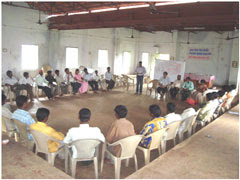Royal D’Souza & Chris ValentinoMUMBAI, AUGUST 09, 2009: The Don Bosco Center for Learning (DBCL) Campus at Kurla Mumbai has been agog with varied empowerment, livelihood and outreach activities. Newer programmes for development have been initiated to encourage especially the youth and the women from the lower economic strata to progress socially and economically. Concerted efforts have been initiated in areas of water conservation, environmental sustenance, apart from the courses that train volunteers to be leaders, facilitators for a better self and a better world.
Through its Social Service Wing, DBCL has initiated and executed several projects in these last two months. Entrepreneurship Development Programmes (EDP) for women, Basic Computer Courses for basti women, Part-time Automobile Course for Youth, Watershed Development Projects, etc. are but only a few exemplary activities.Drawing inspiration from Pandit Jawaharlal Nehru who said “you teach a girl, you teach the whole family,” the Entrepreneurship Development Programme was initiated in collaboration with the Brihan-Mumbai Municipal Corporation to help women from the economically disadvantaged strata to develop management skills, personality grooming, marketing, networking, banking and accounting skills, whereby they would be able to actually implement their creative ideas and thus improve their socio-economic status. As of now, eight such batches comprising 240 women from 30 SHGs have been imparted skills for livelihood.
Working on similar lines, Basic Computer Courses have been initiated to encourage people from the economically deprived sections, especially youth and women. Six batches have been successfully completed within a two-month period, with a total of 106 women emerging as computer literates who are now ready to tap at the keyboard and improve their lives.
Having studied the need for industry-capable employees, DBCL has through the auspices of the St. Joseph Industrial Training Institute (SJITI) taken up the MES (Modular Employable Skills) Programme of the Government and commenced a three-month Automobile Course, that includes theory and practical components, wherein youth from the slums and bastis will be trained in the basics of two and three wheeler repairs.
Another major project of DBCL, Kurla is the NSS (National Social Service) outreach activities with the entire concept of “reaching the unreached with technology”. Under this programme, 100 student volunteers of the DBIT (Don Bosco Institute of Technology) are engaged in reaching out to their less advantaged friends. Some of the activities that have been initiated and successfully completed are:· Teaching students and training teachers of the Brihan-Mumbai Municipal Corporation Schools in computers, English and Value Education.· Library Management for the Institute and Maths Classes for the weaker students of the SJITI· Language Academy and Spoken English Classes for the underprivileged women and youth of the neighbourhod slums and bastis.· Website Designing and Maintenance for the BGVK (Bosco Gramin Vikas Kendra) Ahmednagar, the BMC Social Work Department and the National Social Service Association.
Another ambitious project that has been launched is the “Jal Academy,” a project which handles sustainable and cost-effective ways of preserving the environment and sustaining people in rural areas. The first stage, which involved a survey-cum-research study, has already been completed. Facilitated by the DBDS (Don Bosco Development Society), the students accompanied by a few of the faculty visited the various watershed-development and environment-conservation activities in the rural hinterlands of Ahmednagar, Narukot, Kawant, and Chota Udepur, gaining immense first-information. This research-study, alongwith the detailed analysis and probable solutions were then presented to Fr. Savio Silveira, Ms. Lyra, Mr. Anand (DBDS), few members of the faculty and management. This is to be followed with an in-depth technological research and designing of working models which when implemented would prove beneficial in environment-conservation and watershed-development.
Slowly but surely the DBCL Campus at Kurla is spearheading a human transformation process with the aid of the latest technology, reaching out to the near and the far… it’s “Technology Aaj Kal” all the way!!
 efore visiting the village, the students were briefed about the importance and purpose of Gram Sabhas through two short videos dealing with the benefits of attending Gram Sabhas and the practical problems that people face while participating in them.
efore visiting the village, the students were briefed about the importance and purpose of Gram Sabhas through two short videos dealing with the benefits of attending Gram Sabhas and the practical problems that people face while participating in them. which government systems function in the villages. The experience helped them understand that although many factors prevent people from claming their rights, they can move towards empowerment by insisting on participating in Panchayati Raj institutions.
which government systems function in the villages. The experience helped them understand that although many factors prevent people from claming their rights, they can move towards empowerment by insisting on participating in Panchayati Raj institutions. Attending the Gram Sabha reminded these future leaders of their responsibility towards their villages. The entire experience recalled the story of the film ‘Swades’, wherein the educated hero returns to his village to lead his people to a just form of development. And at Don Bosco Kawant, the time has come for our young people to return to the villages to bring about a CHANGE FOR BETTER LIVING.
Attending the Gram Sabha reminded these future leaders of their responsibility towards their villages. The entire experience recalled the story of the film ‘Swades’, wherein the educated hero returns to his village to lead his people to a just form of development. And at Don Bosco Kawant, the time has come for our young people to return to the villages to bring about a CHANGE FOR BETTER LIVING.




















